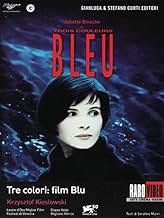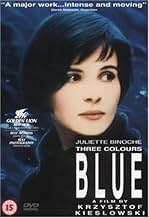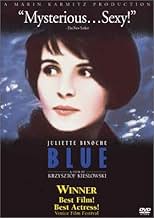Trois couleurs: Bleu
- 1993
- Tous publics
- 1h 38m
A woman struggles to find a way to live her life after the death of her husband and child.A woman struggles to find a way to live her life after the death of her husband and child.A woman struggles to find a way to live her life after the death of her husband and child.
- Awards
- 22 wins & 19 nominations total
Benoît Régent
- Olivier
- (as Benoit Regent)
Charlotte Véry
- Lucille
- (as Charlotte Very)
Hélène Vincent
- La journaliste
- (as Helene Vincent)
Yann Trégouët
- Antoine
- (as Yann Tregouet)
Featured reviews
Instead of saying which is the best and worst (though have often heard 'Red' cited best and 'White' the weakest, though all three films are generally very highly thought of) of Krzysztof Kieslowski's "Three Colours" trilogy, it will just be said that all three films in the trilogy are must-watches in their own way.
The first film in the trilogy 'Three Colours: Blue' serves as a very poignant exploration of grief and liberty (in the emotional sense), and to me it is one of the most moving and interesting depictions of grief and liberty in film. It is heavily symbolic, with its intricate use of music, the dominant use of the colour blue in the colour palette, its interesting use of fade outs (though actually different to their usual use, representative of time standing still rather than it passing or a scene conclusion), links to the main character's past (here the use of falling) and the bottle recycling, but not in an incoherent sense.
Visually, 'Three Colours: Blue' looks stunning. The whole film is shot with aesthetic grace and elegance and while the use of blue is dominant for symbolic reasons it is never gimmicky or cheap. Kieslowski's direction is thoughtful and never intrusive, and the intricate music score and the symbolic way it's utilised (representing Julie's struggles with isolation) is inspired, "Song for the Unification of Europe" is one of the most emotional tracks of music in any film seen by me recently.
Story-wise, 'Three Colours: Blue' challenges in a way but also always engages, mainly because of how movingly and intensely it deals with the tragic story of Julie and its themes of grief and liberty. The pacing is deliberate but never hits a dull spot.
One of 'Three Colours: Blue' is the astonishing performance from Juliette Binoche, an intensely affecting portrayal that ranks high up with her best performances. All the cast are fine, particularly Benoît Régent and Emmanuelle Riva, but in the acting stakes this is Binoche's film.
All in all, a beautiful, thought-provoking and moving film, and a wonderful start for a very interesting trilogy of films. 10/10 Bethany Cox
The first film in the trilogy 'Three Colours: Blue' serves as a very poignant exploration of grief and liberty (in the emotional sense), and to me it is one of the most moving and interesting depictions of grief and liberty in film. It is heavily symbolic, with its intricate use of music, the dominant use of the colour blue in the colour palette, its interesting use of fade outs (though actually different to their usual use, representative of time standing still rather than it passing or a scene conclusion), links to the main character's past (here the use of falling) and the bottle recycling, but not in an incoherent sense.
Visually, 'Three Colours: Blue' looks stunning. The whole film is shot with aesthetic grace and elegance and while the use of blue is dominant for symbolic reasons it is never gimmicky or cheap. Kieslowski's direction is thoughtful and never intrusive, and the intricate music score and the symbolic way it's utilised (representing Julie's struggles with isolation) is inspired, "Song for the Unification of Europe" is one of the most emotional tracks of music in any film seen by me recently.
Story-wise, 'Three Colours: Blue' challenges in a way but also always engages, mainly because of how movingly and intensely it deals with the tragic story of Julie and its themes of grief and liberty. The pacing is deliberate but never hits a dull spot.
One of 'Three Colours: Blue' is the astonishing performance from Juliette Binoche, an intensely affecting portrayal that ranks high up with her best performances. All the cast are fine, particularly Benoît Régent and Emmanuelle Riva, but in the acting stakes this is Binoche's film.
All in all, a beautiful, thought-provoking and moving film, and a wonderful start for a very interesting trilogy of films. 10/10 Bethany Cox
Often times when viewing an intelligent film like this I have to really contemplate what the implications the film maker making mean to me. This film was no exception. Kieslowski, with his background in non-fiction film making, is applying the french political value of liberty to a personal situation. He is, in essence, studying the human condition through fiction. The meaning of "liberty" takes on a very different meaning for Julie in this film. She tries to gain liberty from her memories and her emotions only to find that it is an impossible task. This is not a film to casually throw on after supper. This film requires a commitment by the audience to really consider Kieslowski's implications, for he is telling us (throughout this trilogy) what he thinks makes a "good" person. The score is beautiful and has a character of its own in the plot. A must see for true film lovers but perhaps a little too much for someone expecting a casual encounter.
An accident results in loss and pain, the rejection of a world that you refrain, you seek withdrawal, isolation, segregation, separation, and transition to a life, where you abstain. But seclusion still has links and ties and cords, that retract and pull and cannot be ignored, reconnection through a box, reveals a secret that's unlocked, that begins to reconnect, and to restore.
It's a wonderful performance from Juliette Binoche as she elegantly weaves Kieslowski's tale of freedom into a contemporary setting. Packed full of symbolism that requires numerous visits to absorb, you may find a myriad of interpretations of your own too.
It's a wonderful performance from Juliette Binoche as she elegantly weaves Kieslowski's tale of freedom into a contemporary setting. Packed full of symbolism that requires numerous visits to absorb, you may find a myriad of interpretations of your own too.
Blue is one of those little movies that grows on you. The more you think about it the more you like it. That's not to say that it's not enjoyable to view; the cinematography and music are marvelous. But this is Juliette Binoche's movie. Everything revolves around her character, Julie, who, in the first scene, survives an automobile accident that claims the lives of her famous composer husband and her five-year-old daughter. Now alone the remainder of the movie delves into Julie's long emotional recovery. Not traumatic, or depressing as the subject matter may imply it is instead subtle, graceful, and beautiful.
TROIS COLOURES: BLEU is a rich, dark film with all the Kieslowski marks: death, silence, depression, and the inner torment of outwardly attractive women. After seeing the whole trilogy and the DEKALOG, I'm convinced at Kieslowski's great talent, and his very early death was a true blow to world cinema. Much like Kubrick but with a less ironic nature, Kieslowski loves to make his characters and stories both humanely distant, realistic, and, at the same time, philosophically idealist and dense. I enjoyed BLEU more than BLANC (which was an odd machismic entry in a trilogy mainly focusing on women) but not as much as ROUGE, which I feel is one of the finest, most beautiful, most well-done films I've ever seen.
More specifically, BLEU's focus seems to be on the relationship of a woman's loss of the tactile manifestation of her husband's existance with the ligering notions of his life - especially his music, which pervades the entire film, interrupting at key moments with a blackout and short blast of the overture. To watch Julie struggle with her husband's abandoned secrets (including a mistress Julie befriends) is shattering, frustrating, and perplexing.
Unfortunately, life must move, and, due to that, I can't watch BLEU over and over. However, I did glean from one viewing the complexity of this picture, and recognize its need to be watched over and over, until Kieslowski's last gasps can be properly understood, which is all we can hope to return to a man whose genius was tragically cut short, but still stands as a giant in my view of cinema.
More specifically, BLEU's focus seems to be on the relationship of a woman's loss of the tactile manifestation of her husband's existance with the ligering notions of his life - especially his music, which pervades the entire film, interrupting at key moments with a blackout and short blast of the overture. To watch Julie struggle with her husband's abandoned secrets (including a mistress Julie befriends) is shattering, frustrating, and perplexing.
Unfortunately, life must move, and, due to that, I can't watch BLEU over and over. However, I did glean from one viewing the complexity of this picture, and recognize its need to be watched over and over, until Kieslowski's last gasps can be properly understood, which is all we can hope to return to a man whose genius was tragically cut short, but still stands as a giant in my view of cinema.
Did you know
- TriviaAt the 2018 Visegrad Film Forum, cinematographer Slawomir Idziak claimed that the script and initial cut of this film focused on the journalist character (played by Hélène Vincent) and her efforts to investigate the authorship of the unfinished musical composition that drives the plot. It was only during the editing process that director Krzysztof Kieslowski re-structured the film to focus on Julie (played by Juliette Binoche).
- GoofsWhen Oliver tells Julie he will not incorporate her changes into the musical score, a boom mic is visible briefly as Julie puts down the phone.
- Quotes
Julie Vignon: Now I have just one thing left to do: nothing. I want no possessions, no memories, no friends, no lovers -- they're all traps.
- Crazy creditsThe final credit says in French, "We thank Alfa Romeo who allowed the scene of the accident to the Alfa 164 whose dynamics are of course purely imaginary."
- ConnectionsFeatured in The 51st Annual Golden Globe Awards (1994)
- How long is Three Colors: Blue?Powered by Alexa
Details
- Release date
- Countries of origin
- Official site
- Languages
- Also known as
- Bleu
- Filming locations
- Palais de Justice, Paris 1, Paris, France(hall of justice)
- Production companies
- See more company credits at IMDbPro
Box office
- Gross US & Canada
- $1,324,974
- Opening weekend US & Canada
- $6,413
- Dec 5, 1993
- Gross worldwide
- $1,552,993
- Runtime1 hour 38 minutes
- Color
- Sound mix
- Aspect ratio
- 1.85 : 1
Contribute to this page
Suggest an edit or add missing content


![Watch Bande-annonce [OV]](https://m.media-amazon.com/images/M/MV5BZGFhMTA5ODQtM2Q4OC00NTI0LTkyYjgtMGViODA0YWZjZmI3XkEyXkFqcGdeQXRyYW5zY29kZS13b3JrZmxvdw@@._V1_QL75_UX500_CR0)
![Three Colors: Blue: The Criterion Collection [Blu-ray]](https://m.media-amazon.com/images/M/MV5BZThmZGMzY2EtZTdiNy00NjMwLTk1YTQtOTVlNGIxYjRhZGYzXkEyXkFqcGdeQXVyNzU1NzE3NTg@._V1_QL75_UX500_CR0)































